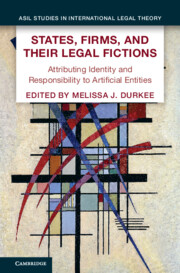 States, Firms, and Their Legal Fictions
States, Firms, and Their Legal Fictions Challenges and Evolution
from Part I - International Attribution
Published online by Cambridge University Press: 29 February 2024
The doctrine of attribution in international law has been defined, in large part, by the International Law Commission’s (ILC) provisions on attribution of conduct in the Articles on State Responsibility for Internationally Wrongful Acts (ARSIWA). It is uncontroversial to note that despite the influence of the ILC’s rules on attribution, the regime of international responsibility remains underdeveloped. In addition to being underinclusive, the rules of attribution in ARSIWA are beginning to appear outdated. The central question, therefore, is whether the rules of attribution in ARSIWA are flexible enough to accommodate two disparate trends. On the one hand, we have witnessed an outsourcing of public functions to private actors in areas such as immigration, prison management, and education, whereby privatization has reduced state control and, consequently, potential state responsibility. On the other hand, there is a marked centralization of power in SOEs, some of which are now playing a global role as investors. This chapter assesses whether the default rules on attribution are flexible enough to manage both ends of the spectrum of state activity, which will be a crucial issue for regulators going forward.
To save this book to your Kindle, first ensure no-reply@cambridge.org is added to your Approved Personal Document E-mail List under your Personal Document Settings on the Manage Your Content and Devices page of your Amazon account. Then enter the ‘name’ part of your Kindle email address below. Find out more about saving to your Kindle.
Note you can select to save to either the @free.kindle.com or @kindle.com variations. ‘@free.kindle.com’ emails are free but can only be saved to your device when it is connected to wi-fi. ‘@kindle.com’ emails can be delivered even when you are not connected to wi-fi, but note that service fees apply.
Find out more about the Kindle Personal Document Service.
To save content items to your account, please confirm that you agree to abide by our usage policies. If this is the first time you use this feature, you will be asked to authorise Cambridge Core to connect with your account. Find out more about saving content to Dropbox.
To save content items to your account, please confirm that you agree to abide by our usage policies. If this is the first time you use this feature, you will be asked to authorise Cambridge Core to connect with your account. Find out more about saving content to Google Drive.